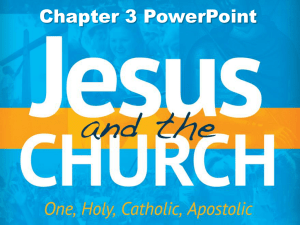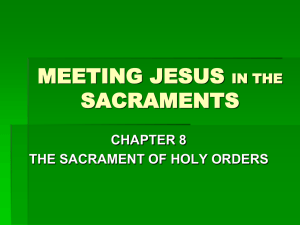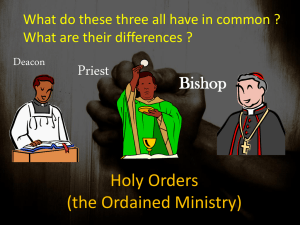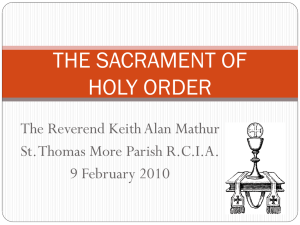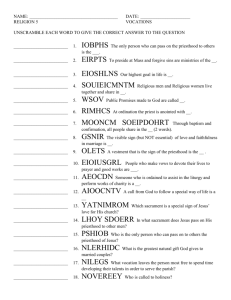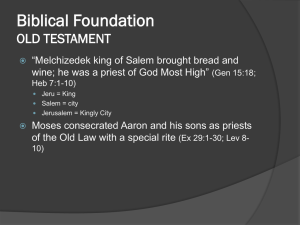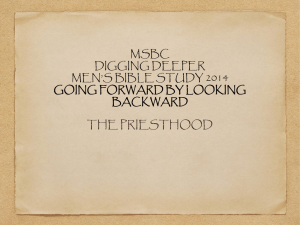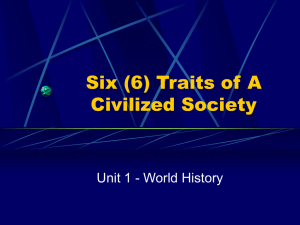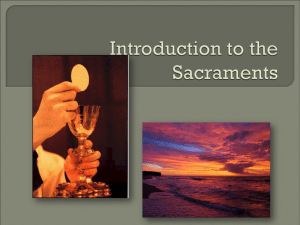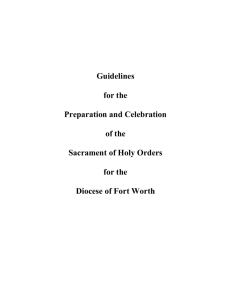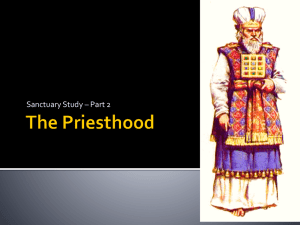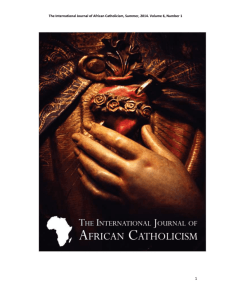El sacramento del Orden
advertisement
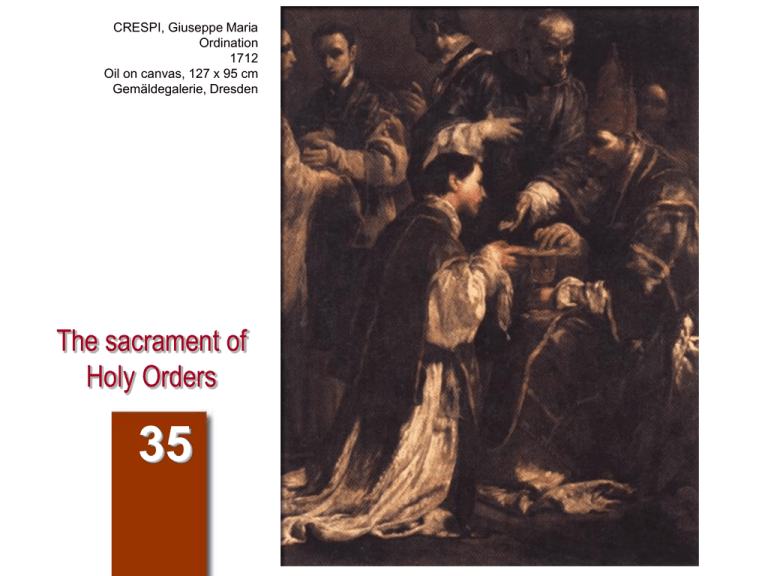
CRESPI, Giuseppe Maria Ordination 1712 Oil on canvas, 127 x 95 cm Gemäldegalerie, Dresden The sacrament of Holy Orders 35 Compendium of the Catechism 322. What is the sacrament of Holy Orders? 1536 It is the sacrament through which the mission entrusted by Christ to his apostles continues to be exercised in the Church until the end of time. Introduction In order to cater for the social needs of the Church and of civil society, Jesus Christ instituted the sacraments of Holy Orders and Marriage with the aim of sanctifying others. That is why they are called sacraments at the service of communion. Let us begin with the sacrament of Holy Orders. VÁCSLAV BROZIK, Wenceslas (1851-1901) A Bishop Oil on canvas 18 1/2 x 15 1/4 inches (47 x 39 cm) Private collection Main ideas 1. All Christians participate in different ways in Christ’s priesthood Our Lord granted His Church a participation in His priesthood through the sacrament of Holy Orders. This unique participation is known as ministerial priesthood, by which men can act in the name of Christ, Head of the Church. These men are the bishops and priests. But it should also be pointed out that the whole Church, founded by Christ, is a priestly people, and by baptism all faithful participate in the priesthood of Christ. This participation is called the common priesthood of all the faithful. EL GRECO (1541-1614) Christ Oil on canvas, 1590-1595 24 x 18 inches (61 x 46 cm) National Gallery, Prague 2. The common and ministerial priesthoods are essentially different. The ministerial priesthood differs essentially from the common priesthood of the faithful, because it confers on the priest a sacred power at the service of his brothers. Those who have received Holy Orders are Christ’s ministers, that is, Christ’s instruments to continue His work of salvation in the world. This they do through teaching, divine worship and pastoral governance. RUBENS, Peter Paul Abraham and Melchizedek 1615-18 Musée des Beaux-Arts, Caen, France 3. The institution of the sacrament of Holy Orders POUSSIN, Nicolas The Sacrament of Ordination 1636-40 Oil on canvas Collection of the Duke of Rutland, Belvoir Castle Christ chose His apostles and at the Last Supper instituted the priesthood of the New Covenant. He told the apostles and their successors to renew the sacrifice of the cross. With the words “Do this in remembrance of me” (Luke 22:19), He made them priests of the New Testament. On the day of His Resurrection, He conferred on them the power to forgive or retain sins. Since the apostles knew that the priesthood must continue in the Church after they would die, when evangelizing a city and before setting out for a new one, they imposed their hands on others, conferring on them the priesthood (Cf. 2 Timothy 1:6; Acts 14:23). 4. The three degrees of the sacrament of Holy Orders The sacrament of Holy Orders consists of three degrees related to each other. The episcopate and priesthood are different degrees of the ministerial participation in the priesthood of Christ. Deacons help bishops and priests. Thus, the term priest designates both bishops and priests, but not deacons. Nevertheless all three degrees are conferred through the sacrament of Holy Orders. When we say priests, we usually refer to those in the priesthood. CARPACCIO, Vittore (1450-1525) St. Stephen is Consecrated Deacon Tempera on canvas, 1511 58 1/4 x 90 7/8 inches (148 x 231 cm) Staatliche Museen, Berlin 5. A priest is a man consecrated to God forever DA FOSSANO, Ambrogio Ordination of St. Augustine Galleria Sabauda, Turin, Italy Through the sacrament of Holy Orders the priest is Christ’s minister, a mediator between God and men, who has the duties of worshipping God –adoration, thanksgiving, satisfaction and petition— and of communicating grace to men. The powers conferred on priests, powers that even angels do not have, are not temporal but permanent. Those who receive this sacrament receive an indelible character and become priests forever. This sacrament can be received only by baptized men who fulfil the due conditions. 6. The ministry of priests The main ways in which priests exercise their ministry are the following: Preaching the word of God. Administering the sacraments, mainly that of Holy Mass. Guiding Christians to sanctity. Addressing God with the official prayer of the Church. CHEVILLIARD, V. The Priest's Birthday Josef Mensing Gallery, Hamm-Rhynern, Germany 7. The spiritual mission of the priest The mission of the priest in this world is primarily spiritual: leading men to God, instructing them in the faith and dispensing the grace contained in the sacraments. The priest is a servant of the whole Christian community and an element of unity. Hence the Church requires that Priests be easily recognizable even by their external attire. Their whole day should be filled up with priestly activities, without time to devote themselves to other matters, for example, such as those proper to the lay faithful. BENLLIURE Y GIL, José (1855-1937) Sacerdote revestido [The covered priest] Oil on linen, 1876 33 3/8 x 24 3/4 inches (85 x 63 cm) Museo de Bellas Artes de Valencia en su Historia, Valencia 8. Duties of the faithful towards priests Given the sublime dignity of the priest and the necessity of his ministry for the Church, it is strongly recommended that parents should give their sons complete freedom to follow this vocation, if God calls them to the priesthood. All the faithful should pray that God may grant His Church good shepherds and ministers full of zeal. We should show great respect, veneration and love for priests, keeping in mind that they are Christ’s ministers –fathers and shepherds of souls. We must help them too in their material needs. BAGNOLD BURGESS, John (1830-1897) The Favourite Priest Oil on canvas, 1880 37 3/8 x 48 inches (95 x 122 cm) Private collection Resolutions for Christian life Resolutions to move forward Pray that there may be many vocations to the priesthood. Pray that priests are holy, as is expected of them. Receive with joy the vocation to the priesthood, if God gives it to you. Look after priests in parishes, in schools, etc., with affection and respect.
